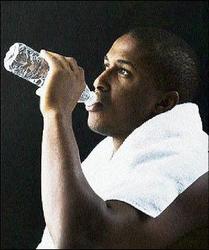Ted Emmanuel, Contributor

The heat is on and with this intense heat comes the overwhelming desire to drink more liquid to quench one's thirst.
Over the years, doctors have been recommending eight 8-ounce glasses of water daily, 64 ounces minimum to keep us properly hydrated. But is this recommendation scientific? Hold on to your thirst. Experts have concluded that there is no science behind the data.
In an article published on July 6, 2003 in the Columbus Dispatch, author Edward Eveld noted that undoubtedly water is important for health but the query is up on the eight-a-day recommendation and whether this includes caffeinated drinks. In fact, drinking too much water is potentially risky. Eveld also points out, that the notion that water has to come out of a glass is not true. Senior programme officer at the Federal Food and Nutrition Board in the United States, Paula Trumbo, stresses that fruits and vegetables are excellent sources of water.
Too much is dangerous
Another fallacy shared by Eveld is the notion of 'staying ahead of your thirst'. According to him, while people should be drinking enough to ward off dehydration, the long-held belief that everyone should drink as much as they can is also dangerous.
This information has served to reinforce vital instructions which I have shared with the public over the past 30 years. It is critical that persons minimise their water intake due to their overly acidic diet of fatty foods. This fat hampers the capacity of the cells to absorb water and as a result, the individual is constantly thirsty, which leads to excessive consumption of water.
What we need to understand is that this dehydration is at a cellular level, therefore, one is drinking but the cells are not absorbing; the water is, therefore, stored in the body. For years, persons have been ignoring this fact, now the scientific evidence is available to support this.
Eat less fat
How can the problem be corrected? A lifestyle change to minimise the intake of fatty foods such as fried foods, meat, dairy products, nuts and seeds, among others. Exercise is also important to burn the fat, as well as remove the urine from the body which is stored as waste.
But what are the facts pertaining to the quality and quantity of water?
Water and health
The truth is, the human body is 70 per cent water and all the body's functions are dependent on it.
Water supports the body's ability to digest food and absorb nutrients.
Water helps cleanse the body by carrying wastes and toxins from the cells to elimination.
Water transports dissolved vitamins and minerals to where they are needed.
Water regulates body temperature and aids in keeping the body supple by lubricating mucous membranes and soft tissues that allow joints and muscles to work smoothly.
Water and ageing
Most of us are chronically dehydrated, plain and simple. We do not drink enough water. Dehydration contributes to the ageing process. Another critical factor is the pH balance of water. All fluids have a certain level of acidity or alkalinity, measured in pH value running from 0-14. It is important that water be in line with the body's blood and pH level which is neutral, ranging from about 7.35 to 7.45.A lower pH indicating more acidic water is unhealthy as it leads to the disease state.
Ted Emmanuel is a Naturopathic Physician.

